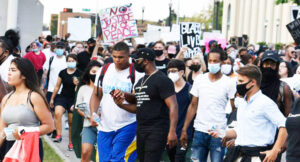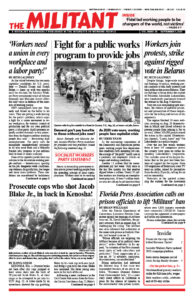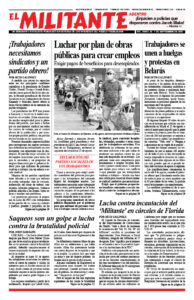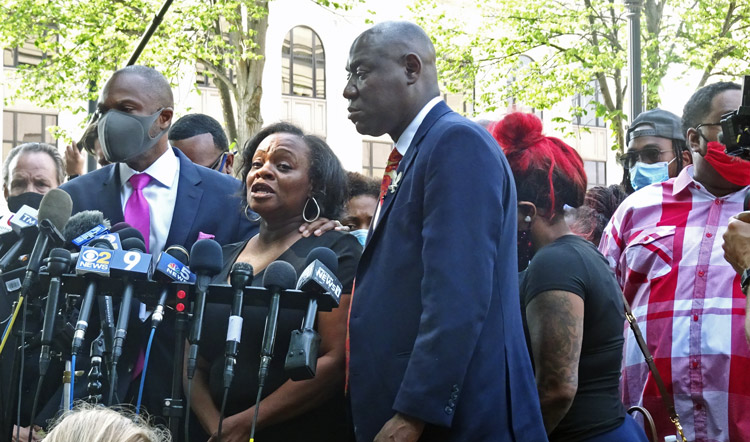KENOSHA, Wis. — Protests broke out here after city cops pumped at least seven shots into the back of 29-year-old Jacob Blake Jr., at close range as he attempted to get into his SUV Aug. 23. A video made by an eyewitness showed the cop grabbing Blake by his tank top with one hand, and firing a gun with the other. Blake was unarmed. His three young sons were in the back of the car.
Addressing a news conference in the Civil Center Park across from the Kenosha County Courthouse Aug. 25, Blake’s father, also named Jacob Blake, thanked everyone for coming out in support of his son. “They shot my son in the back. Like he didn’t matter,” he said. “But my son matters. He’s a human being, and he matters.”
Blake Jr. is now paralyzed from the waist down in a Milwaukee hospital, where he was airlifted two days ago. Attorney Patrick Salvi, one of several lawyers representing the Blake family, told the news media Blake’s injuries included a severed spinal cord, some shattered vertebra, damage to his kidneys and liver, several holes in his stomach, and most of his large colon and small intestine had been removed.
Blake’s mother, Julia Jackson, and three of his sisters also spoke. “So many people have reached out to say, ‘I’m sorry.’ But don’t be sorry. I’m not sorry. I’m angry,” Letetra Wideman, one of the sisters, said. “I’ve been watching police kill people who look like me for years. Kill members of my family. Emmett Till was my family. Michael Brown was my family. George Floyd was my family. I’m not sad. I don’t want your pity. I want change.”
Following the shooting, hundreds of protesters marched from the shooting site to the Kenosha County Courthouse. A second march took place the next day. Hundreds of protesters stretching several blocks marched ahead of a caravan of honking cars through the streets of Kenosha in the evening of Aug. 24 to denounce police abuse, according to the Chicago Sun-Times. Protests have continued.

Later in the night, opportunist anarchists and others turned to destruction, including burning down small businesses in Uptown and other working-class and Black neighborhoods. Four blocks in Kenosha’s Uptown district were almost leveled. This reporter saw smoke still rising from some of the rubble.
On Aug. 24 Wisconsin Gov. Tony Evers declared a state of emergency and called in 125 members of the state National Guard. A dawn-to-dusk curfew was imposed, which is still in place. Armed vigilante-type groups have shown up.
The Kenosha County Board Aug. 26 wrote to the governor asking for 1,500 more National Guard.
Blake’s father said the police were responsible for the violence and damage, not his son. “My son is not responsible for it. My son didn’t have a weapon. He didn’t have a gun,” he told the Chicago Sun-Times.
Debate over violence, destruction
Naomi Craine, Socialist Workers Party candidate for U.S. Senate from Illinois, drove to Kenosha to participate in the protests and talk with workers there. She attended the news conference. One big topic of debate and discussion is the question of the late-night destruction and violence as opposed to disciplined mass action.
Blake’s family has been firm in speaking out both for protests and against destruction and looting. “As I was riding through here, through this city, I noticed a lot of damage that doesn’t reflect my son or my family,” Julia Jackson told the press. “If Jacob knew what was going on as far as that goes, the violence and destruction, he would be very unpleased.”
The family has a history in the fight against racial discrimination and police violence. Jacob Blake Sr., Jacob’s grandfather, was a minister and leader of civil rights protests against housing discrimination in Evanston, Illinois, in the 1960s.
Craine met Colesha Lyttle, who works as a dialysis technician, and Doreen Wright, her mother, in the park where the press conference was held. “The first night I came out to protest. I got so angry, I said I had to be part of protesting,” Lyttle said. “I went to where the shooting happened and then we marched to the police station. I left before the craziness started.”
“This affects us all,” she said. “I have an 18-year-old son. I’m scared for my kid. The police don’t ask questions, they shoot first. Black people have to live with heightened fear.”
Wright, who is originally from Jamaica, said, “A journalist asked me what I thought about them burning things down. I don’t condone it, but people need to start speaking out.
“I don’t think this [the burning] is the protesters. It’s opportunists. Why do they burn down the neighborhood? The people who live here don’t own anything. They need education, good jobs,” she said. “It’s not like when Martin Luther King was marching and people stuck together.”
“Yes, we need to build a disciplined mass movement like the civil rights movement of the 1950s and ’60s,” Craine said. “The breadth of the response to the killing of George Floyd and the recent labor strikes over wages and working conditions. like the 63-day strike by shipbuilders in Bath, Maine, show the potential to build such a movement. That would make growing numbers of working people feel comfortable to join our actions and push aside the small minority that want confrontational violence against police, wanton destruction and looting.”
“We need a labor party to mobilize working people, including in protests against police brutality,” said Craine. “It could chart a course towards taking political power out of the hands of the capitalist rulers, and building a workers and farmers government. We need to replace the capitalist system, that breeds both racism and exploitation.”


